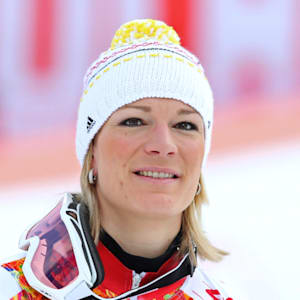Maria Höfl-Riesch
Biografia
After early successes came in the slalom, in which she claimed Olympic and world championship crowns, Maria Höfl-Riesch went on to become one of the truly outstanding all-rounders of women’s Alpine skiing.
Triumphant beginnings
Born in the shadow of the Garmisch-Partenkirchen ski resort in Bavaria, Maria Höfl-Riesch, née Riesch, was a competent skier by the age of three, and by five was a member of her local ski club. She stood out at every age category, making a name for herself on the international junior circuit from 1999 onwards, winning nine medals – including five golds – at the FIS World Junior Championships, spread across every Alpine discipline. A leading light of the German women’s Alpine ski team before she had even turned 20, she won her first FIS World Cup events in February 2004. Foreshadowing her future versatility, she triumphed in the downhill and super-G in Haus Im Ennstal (AUT), and in the slalom in Levi (FIN).
Decade at the top
Höfl-Riesch’s entire career was marked by her ability to shine in both speed and technical events, with the giant slalom remaining the only discipline in which she did not manage to assert her dominance. With the exception of two years (2005 and 2006) that were marred by serious injuries, one of which forced her to miss the 2006 Olympic Winter Games in Turin, she was a leading contender for the large crystal globe every single season in which she competed.
A remarkable CV
Having married her manager, Marcus Höfl, in 2011, the German went on to enjoy tremendous success in subsequent years, claiming three Olympic gold medals (slalom and super combined in 2010; super combined in 2014) and one silver (super-G in 2014), two world titles (slalom in 2009; super combined in 2013), and an overall World Cup crown (in 2011). During that period, she also obtained five small crystal globes (one in downhill, one in combined, two in slalom and one in super-G), 27 individual victories and 81 podium berths, from 356 starts.
Double gold in Vancouver
On 18 February 2010, at the Winter Games in Vancouver, Höfl-Riesch started off her fortnight in Whistler by coming in second behind her good friend Lindsey Vonn of the USA in the downhill component of the super combined competition. A solid time in the slalom segment saw her seal Olympic gold, as she finished almost a second ahead of another American rival Julia Mancuso. A week later in the slalom event itself, the confident Bavarian made light of difficult conditions, keeping her head to hold off the challenge of Marlies Schild (AUT) to top the standings and capture her second gold.
Sochi swansong
On 10 February 2014 at the Rosa Khutor Alpine Resort, Höfl-Riesch took to the slopes to defend her super combined title. Lying fifth and just over a second behind Mancuso after the downhill leg, the majestic German put in a typically splendid performance in the slalom to become one of only two skiers – along with Croatia’s Janica Kostelic (2002 and 2006) – to win two successive gold medals in the combined event. In doing so, she also joined compatriot Katja Seizinger as the only German woman to win three Alpine skiing golds. Five days later, she came close to making it four, but a mistake on the final mogul of the super-G meant she had to settle for silver behind Anna Fenninger (AUT).
Bowing out on a high
On 20 March 2014, clutching her final trophy – the small crystal globe for downhill – Höfl-Riesch announced her retirement. “I gave everything I had to win another Olympic medal. I worked so hard to achieve that aim. The super combined went very well in Sochi; it was a real liberation for me,” she said. “The decision to retire was a tough one to make, but I accomplished my goal, and I agree with the theory that you should end your career on a high note.”
Destaque
Maria Höfl-Riesch
Repetições
Resultados Olímpicos
Athlete Olympic Results Content
You may like

